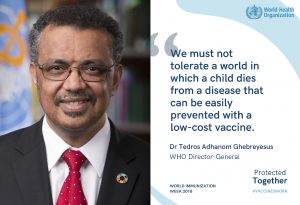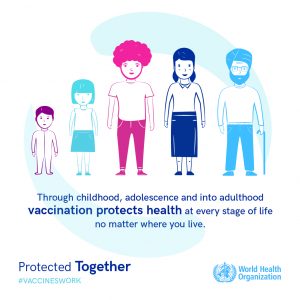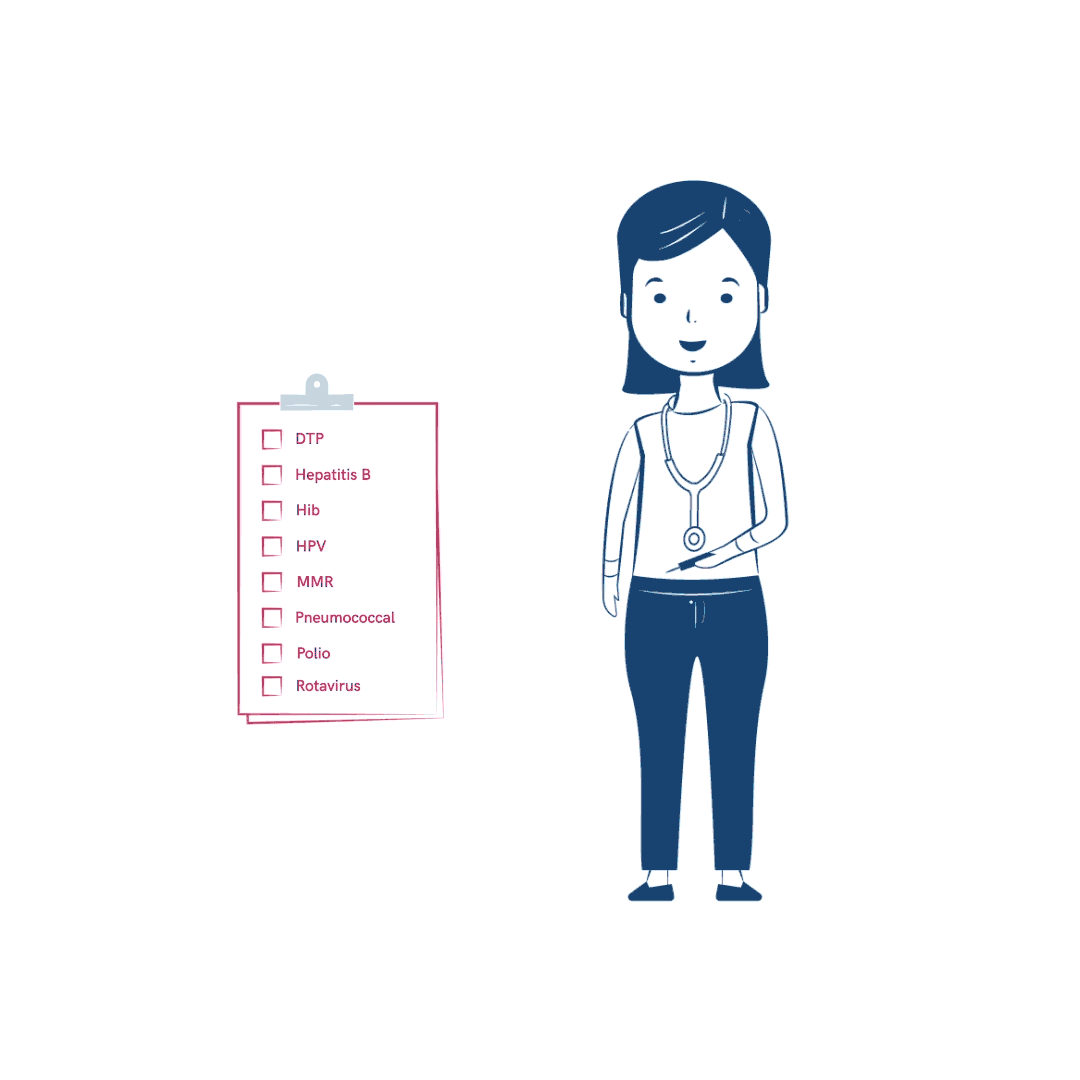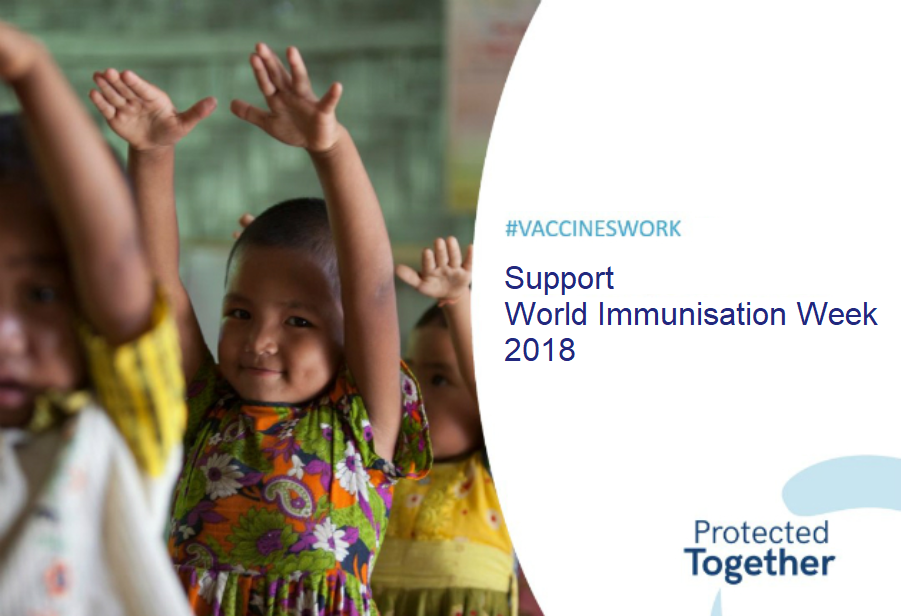
Wimbledon 2020 Cancelled
It is almost that time of the year when people would go watch a sporting

World Immunisation Week is an annual event of the World Health Organisation (WHO). The campaign aims to promote global awareness of vaccines and their importance. The awareness week furthermore aims to encourage the use of vaccines to save millions from unnecessary suffering. In 2018, the World Immunisation Week is an action-oriented campaign that focuses on how everyone can help, with the theme “Protected Together, #VaccinesWork”. Both donating to the cause and promoting it as individuals can play a big part in easing needless suffering by preventing disease.
The WHO and its global partners are working to draw attention to the importance of immunisation and push for their widespread use, particularly in countries vaccines are either still not available or not an important part of regular health practices. Governments, organisations and individuals are encouraged to recognise the need to promote and invest in these efforts. Everyone needs to get involved for vaccinations to be made available to everyone who needs them.
Administering vaccines is one of the most effective methods of health intervention available. Immunisation saves millions of lives that would otherwise be needlessly lost to diseases such as cervical cancer, hepatitis B, mumps, pneumonia, rotavirus diarrhoea, and many more. In some parts of the world, however, there are about 19.5 million children who are not able to receive these basic and life-saving vaccinations. A lack of government investment in immunisation efforts, a lack of advocacy by influential groups, and a lack of initiative to bring children for vaccination are all challenges that we face in the fight to bring them what they need. We need greater awareness and funding.
 Since the late 1980s, the WHO has worked to give countries all over the world access to vital vaccines. They have succeeded in nearly eradicating debilitating polio – only 3 countries now have cases, 99% less than the 125 countries recorded in 1988. In the last 7 years, the organisation also achieved an 84% drop in deaths caused by measles by simply seeing through the administration of the vaccine. In 2016 alone, 116.5 million infants received the proper doses of the diphtheria-tetanus-pertussis vaccine to protect them from several infectious and debilitating diseases.
Since the late 1980s, the WHO has worked to give countries all over the world access to vital vaccines. They have succeeded in nearly eradicating debilitating polio – only 3 countries now have cases, 99% less than the 125 countries recorded in 1988. In the last 7 years, the organisation also achieved an 84% drop in deaths caused by measles by simply seeing through the administration of the vaccine. In 2016 alone, 116.5 million infants received the proper doses of the diphtheria-tetanus-pertussis vaccine to protect them from several infectious and debilitating diseases.
The numbers look very good, but it is not enough. The 2012 Global Vaccine Action Plan (GVAP) of the World Health Assembly targeted 2020 as the year that these preventable diseases would be eradicated. The 194 countries who were part of this plan to promote immunisation as a preventive measure against millions of deaths have not been as successful as hoped. Individual countries have of course made improvements in the availability and administration of vaccines, but the elimination of such life-threatening diseases as measles, rubella, maternal and neonatal tetanus, and others, is not proceeding as planned.
 On the surface, we can see that proper immunisation protects millions of children from many deadly diseases. For entire countries, the lack of universal vaccine administration means a poor chance at achieving sustainable development. Vaccines are basic to building and sustaining a robust primary healthcare system. They help to control viral outbreaks by reducing susceptibility, and to prevent resistance to antimicrobial drugs by reducing the number of people who need them to combat preventable diseases. On a global scale, immunisation is the foundation of universal health coverage for development. Staring health care early means a chance at a healthier life, and bearing healthier babies.
On the surface, we can see that proper immunisation protects millions of children from many deadly diseases. For entire countries, the lack of universal vaccine administration means a poor chance at achieving sustainable development. Vaccines are basic to building and sustaining a robust primary healthcare system. They help to control viral outbreaks by reducing susceptibility, and to prevent resistance to antimicrobial drugs by reducing the number of people who need them to combat preventable diseases. On a global scale, immunisation is the foundation of universal health coverage for development. Staring health care early means a chance at a healthier life, and bearing healthier babies.
Despite all our advances in technology, there has been no growth in global vaccination coverage in the past year. This leaves 14% of the world’s children still unable to access the basic vaccines that could easily save them from suffering, debilitation and death.
Make sure that your child is healthy during the weeks before any scheduled immunisation. Consult your healthcare provider regarding an infant’s or child’s health status and what precautions to take for each specific vaccine. Some vaccines are dangerous to administer is a child is in a weakened state.
Remain calm and be confident leading up to the immunisation. Children are highly attuned to parents’ emotions and can sense fear and anxiety. To help a child stay calm, make sure that they have a comforting object such as a favourite toy to hold and play with. To help a baby stay calm, nurse before, during and after the shot.
Do not give a child pain relievers like acetaminophen (e.g. Tylenol, Tempra) or ibuprofen (e.g. Advil) before the shot. They are not effective at preventing pain and giving them too early will mean that you cannot give them another dose when they really need it, after the shot. Instead, apply a topical anesthetic on the area that will receive the vaccine about one hour prior. Be sure to ask your doctor or a pharmacist what is best to use.
Explain to older children what will happen during the shot. Be honest about the pain, explaining that it will feel like a pinch for a few seconds, and why it is important to endure it.

Hold your baby or older child close during immunisation to offer needed security and support. Occupy a child with interesting yet relaxing distractions like a favourite toy, book or show. Breathe deeply with older children as you physically comfort them. Always use a soothing voice and acknowledge pain, but don’t focus in it.
After a vaccine is administered, you can now give acetaminophen as prescribed, but only if they are fussy or crying. Wait there for 15 minutes after the shot to see if there are any signs of a reaction to the vaccine. You will want to get immediate attention if a child has an unusual response to the vaccine.
Fever and pain are common within 2 days after immunisation, as are redness and swelling at the injection site. Make your child as comfortable as possible during this period, as if they were ill. Provide them with the best pillows and bamboo sheets to keep them cool and feeling at ease. Treat fevers as immunisation provider prescribes and relieve discomfort by regularly applying a cold cloth or cool gel pack to the forehead and to the injection site.
Treat pain with acetaminophen or ibuprofen as prescribed by your doctor or immunization provider. Encourage the child to move the limb where the injection was administered. Explain that it will help the healing process.
A lump can sometimes form under the skin where the injection was administered, and can remain for 1-4 weeks. If your child develops any strange reactions within 4 weeks of the vaccine, contact your immunisation provider.
Be a comfort to your child throughout this experience to help them accept vaccines as positive and avoid fear of succeeding immunisations.


It is almost that time of the year when people would go watch a sporting

Queen Elizabeth II has two birthdays to celebrate: her actual birthday on 21 April and

The first of May is celebrated by many countries around the world as Labour Day